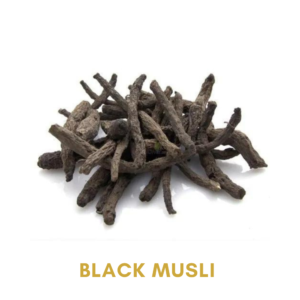- Ashwagandha Extract
- Shatavari Extract
- Black (Kali) Musli Extract
1. Ashwagandha Extract
Ashwagandha (Withania somnifera) is an herb that has been used in traditional Ayurvedic medicine for centuries. While it is often known for its potential stress-relieving and adaptogenic properties, it may also play a role in supporting weight gain in some individuals. It’s important to note that the effects of Ashwagandha on weight can vary from person to person, and individual responses may differ.
Here are some ways in which Ashwagandha extract might contribute to weight gain:
Cortisol Regulation: Ashwagandha is considered an adaptogen, which means it may help the body adapt to stress and maintain balance. High levels of stress can lead to increased cortisol production, a hormone associated with weight loss and muscle breakdown. By helping to regulate cortisol levels, Ashwagandha may indirectly support healthy weight gain.
Appetite Stimulation: Some studies suggest that Ashwagandha may have appetite-stimulating effects. Increased appetite can lead to higher caloric intake, which, when combined with a balanced diet and appropriate exercise, can contribute to weight gain.
Muscle Mass and Strength: Ashwagandha has been studied for its potential to enhance muscle strength and increase lean body mass. As muscle weighs more than fat, an increase in muscle mass can contribute to overall weight gain.
Thyroid Function: The herb may also have a modulating effect on thyroid function. Proper thyroid function is crucial for maintaining a healthy metabolism, and any imbalance could affect weight. By supporting thyroid health, Ashwagandha may indirectly contribute to weight management.
Improved Sleep: Adequate and quality sleep is essential for overall health, including weight management. Ashwagandha has been studied for its potential to improve sleep quality, and better sleep can positively impact weight gain by promoting overall well-being.
Anti-Inflammatory Effects: Chronic inflammation has been linked to various health issues, including weight-related problems. Ashwagandha exhibits anti-inflammatory properties, and by reducing inflammation, it may contribute to overall health and potentially support weight gain.
Healthy weight management involves a combination of a balanced diet, regular exercise, sufficient sleep, and individual lifestyle factors. Before incorporating any supplement, including Ashwagandha, into your routine, it’s advisable to consult with a healthcare professional to ensure it is safe and appropriate for your specific circumstances. Additionally, individual responses to supplements can vary, so what works for one person may not work the same way for another.
2. Shatavari Extract
Shatavari (Asparagus racemosus) is a herb that is commonly used in Ayurvedic medicine, and it has a reputation for various health benefits, including its potential to support weight gain in some individuals. It’s important to note that while there is some traditional and anecdotal evidence supporting these claims, scientific research on Shatavari’s specific role in weight gain is limited.
Here are some ways in which Shatavari extract might be associated with supporting weight gain:
Appetite Stimulation: Shatavari is believed to have appetizing properties, meaning it may stimulate the appetite. By increasing the desire to eat, individuals may consume more calories, contributing to weight gain.
Nutrient Absorption: Some traditional uses of Shatavari involve its role in improving digestion and nutrient absorption. Enhanced nutrient absorption can ensure that the body receives the necessary vitamins and minerals for overall health and well-being, potentially supporting healthy weight gain.
Hormonal Balance: Shatavari is considered an adaptogenic herb, meaning it may help the body adapt to stress and maintain hormonal balance. Hormonal imbalances can sometimes lead to weight-related issues, and by promoting equilibrium, Shatavari may indirectly contribute to weight management.
Muscle Mass Development: Like Ashwagandha, Shatavari may have properties that support muscle development. Increased muscle mass can add to overall body weight, and it may contribute to a healthy and balanced physique.
Anti-Inflammatory Effects: Chronic inflammation has been linked to various health issues, including those related to weight. Shatavari has anti-inflammatory properties, and by reducing inflammation, it may contribute to overall health and potentially support weight gain.
Stress Reduction: Chronic stress can lead to weight loss or difficulty in gaining weight. Shatavari’s adaptogenic properties may help in managing stress, potentially preventing stress-related weight loss and supporting overall well-being.
It’s crucial to note that while Shatavari is generally considered safe for many people, individual responses to herbs and supplements can vary. Furthermore, scientific research on Shatavari’s specific effects on weight gain is limited, and more studies are needed to establish its efficacy in this regard.
If you are considering using Shatavari or any other herbal supplement for weight gain or other health purposes, it is advisable to consult with a healthcare professional. They can provide personalized advice based on your health status, potential interactions with medications, and individual needs. Additionally, maintaining a balanced diet, engaging in regular physical activity, and addressing any underlying health issues are essential components of a holistic approach to weight management.
3. Black Musli Extract
Black Musli, scientifically known as Curculigo orchioides, is an herb that has been traditionally used in Ayurvedic medicine for various purposes, including its potential role in supporting weight gain. It’s important to note that while there is some traditional and anecdotal evidence, scientific research on the specific effects of Black Musli extract on weight gain is limited.
Here are some ways in which Black Musli extract might be associated with supporting weight gain:
Appetite Stimulation: Like some other herbs, Black Musli is believed to have appetizing properties, which may stimulate the appetite. By increasing the desire to eat, individuals may consume more calories, potentially contributing to weight gain.
Nutrient Absorption: Traditional uses of Black Musli suggest that it may have a role in improving digestion and nutrient absorption. Efficient absorption of nutrients is crucial for overall health, and it may indirectly support weight gain by ensuring the body receives the necessary vitamins and minerals.
Energy Boost: Some traditional practices claim that Black Musli can provide a natural energy boost. Increased energy levels may encourage individuals to engage in physical activities, which, when combined with a proper diet, can contribute to healthy weight gain.
Hormonal Balance: Black Musli is sometimes considered an adaptogenic herb, and it may help in maintaining hormonal balance. Hormonal imbalances can impact various aspects of health, including metabolism and weight. By promoting hormonal equilibrium, Black Musli may indirectly support weight management.
Anti-Inflammatory Effects: Chronic inflammation has been associated with various health issues, including those related to weight. Black Musli, like some other herbs, is believed to have anti-inflammatory properties, and by reducing inflammation, it may contribute to overall well-being and potentially support weight gain.
It’s crucial to understand that while Black Musli is generally considered safe for many people, individual responses to herbs and supplements can vary. Additionally, scientific research on Black Musli’s specific effects on weight gain is limited, and more studies are needed to establish its efficacy in this regard.
If you are considering using Black Musli or any other herbal supplement for weight gain or other health purposes, it is advisable to consult with a healthcare professional. They can provide personalized advice based on your health status, potential interactions with medications, and individual needs. Also, maintaining a balanced diet, engaging in regular physical activity, and addressing any underlying health issues are essential components of a holistic approach to weight management.


